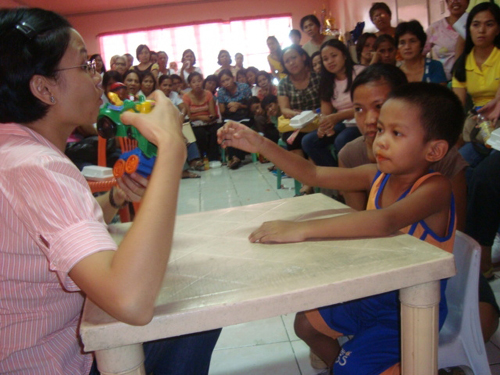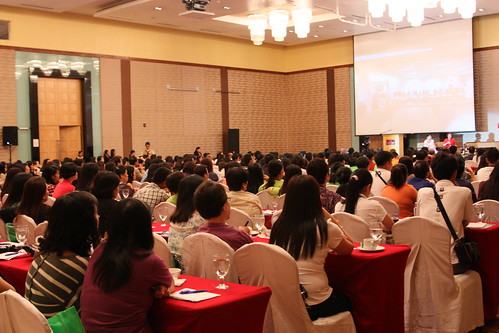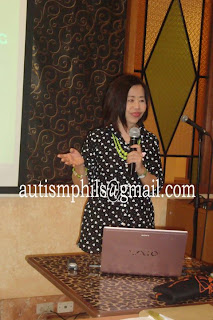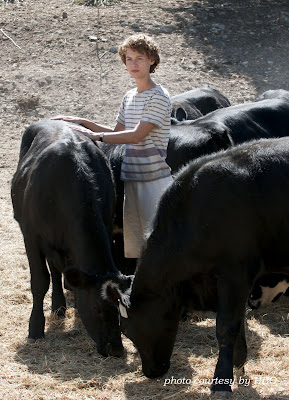By DANG U. KOE, ASP Chair Emeritus
Children with special needs become a fastfood restaurant crew for a day, taking orders, preparing the food, and showing to the customers that they too can work...
MANILA, Philippines — How do you teach a child with autism to work in a dynamic environment, listen to different authority figures, respond to spontaneous social greetings by strangers, and have fun while learning all these things?
Try McDonald’s Kiddie Crew! Skill Builders Therapy Center has been working with McDonald’s Quirino Avenue branch to allow children with special needs to participate in their Kiddie Crew program. The occupational therapists (OT) in charge this year are Vanessa Tan-Ibanes and Kathleen Teppang.
This week’s Angel Talk is Anna Yap Tan Pascual, founder and co owner of Skill Builders Therapy Center.
Five years ago, she developed the first program that helped kids with special needs participate successfully in McDonald’s Kiddie Crew activity.
Although she is currently based in Sydney, Australia, Anna’s heart still says “Love ko ‘to!” when it comes to Filipino children with special needs.
*****
This past summer, six children with autism and other special needs were supported by OTs of Skill Builders Therapy Center as they joined the Kiddie Crew program at McDonald’s Quirino Avenue. Prior to going to McDonald’s, the children underwent training to prepare themselves for the demands of the program.
The program consists of an art workshop, on-floor training, and snack time. Initially, the children showed varying degrees of discomfort with the new environment, including controlling their impulses. But the OTs had to assist them in order to allow them to gain maximum benefit from the experience.
During art time, the children practiced their ability to follow directions, share, and pack away materials. Snack time was an opportunity to practice making choices about what to eat, wait to be served, stay with the Kiddie Crew, and display good table manners.
But for almost all the children, on floor training time was the best part of the program!
EVOLUTION OF KIDDIE CREW MEMBERS
Clarissa, 8, and Matthew, 12, first responded slowly to instructions given by the McDonald’s crew. But later on, as they got more familiar with the tasks, they responded faster and showed better initiative in doing their assigned work.
Derek, 11, had a hard time dealing with the busy counter and reception area, but gradually became calmer and listened to instructions despite the environmental noise.
Llenard, 7, disliked table-top work and displayed “off-task” behaviors (or self-stimulatory behaviors often initiated by children with autism). However by the second day, he eagerly participated in the tasks. He loved food preparation tasks like making McFloats, getting soda drinks and making spaghetti. Because of this, he showed good waiting skills. Talk about motivation!
Kurt, 7, improved his ability to work independently. Even though he was tempted to touch the screens on the counters and to do tasks that were not assigned to him, he learned to control himself. Kurt loved counter duty and would wait patiently for his turn. He always worked efficiently, so efficient that on their last day, he made a McFloat by himself, even though no one ordered one! (Guess he got to drink that one.)
Gabe, 7, was asked to make sodas, offer straws (but NOT touch them), and prepare trays for customers. He even asked a crew member if he could can make a McFloat for himself instead of making just for customers.
 |
| Gabe tries his hand at preparing drinks at the soda dispenser. |
Making McFloats was also Llenard’s favorite, so much so that he would offer this to customers just so he could have the pleasure of preparing one!
LITTLE AMBASSADORS FOR OTHER CHILDREN WITH SPECIAL NEEDS
These six children served as ambassadors for other children with special needs. Some McDonald’s crew members initially did not assign tasks, thinking that the children would not be able to do much. But the OTs took the initiative to assign tasks to the children, serving as a model to the crew on how to instruct the children and what types of tasks could be give.
To the surprise of the crew members, the children were able to follow directions and work efficiently.
 |
| The kids were also treated to a special meal during the work shop |
Customers showed positive reactions to the children, asking them for their names and ages. The children improved their ability to establish appropriate eye contact while greeting customers and handing out flyers. One customer said of Clarissa.
“She’s very smart and follows immediately…
I was wondering if she is a child with special needs... Ang akala ko kasi kapag may autism, wala talagang alam. Meron din palang magagaling.”
(I thought children with autism knew nothing; now I know there are some who have good skills.)
Derek’s mother was happy that her son had had this opportunity to work in an unstructured setting, since he prefers doing table top work in a quiet place. But during the Kiddie Crew program, Derek showed good ability to work and cooperate with authority figures.
Clarissa surprised her mother by her ability to share and show empathy to others. When another child had a meltdown, Clarissa, patted his back and said, “It’s OK…” Her mother was pleased to realize she knew how to comfort a child in distress.
The children all developed skills that they otherwise would not have learned in a “sterile” therapy session.
They also displayed skills they otherwise would not have needed in a safe, predictable environment. In the process, they surprised their parents, their therapists, the public, and maybe even themselves. What a great learning experience, providing lessons they can now use in their daily lives.
Uploaded with permission
Acknowledgment Manila Bulletin: Work it!











